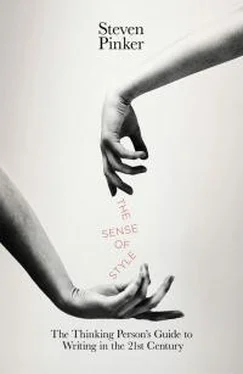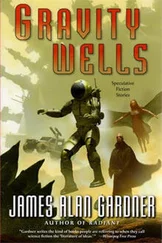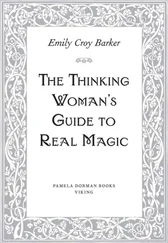Paradoxically, intensifiers like very, highly, and extremely also work like hedges. They not only fuzz up a writer’s prose but can undermine his intent. If I’m wondering who pilfered the petty cash, it’s more reassuring to hear Not Jones; he’s an honest man than Not Jones; he’s a very honest man. The reason is that unmodified adjectives and nouns tend to be interpreted categorically: honest means “completely honest,” or at least “completely honest in the way that matters here” (just as Jack drank the bottle of beer implies that he chugged down all of it, not just a sip or two). As soon as you add an intensifier, you’re turning an all-or-none dichotomy into a graduated scale. True, you’re trying to place your subject high on the scale—say, an 8.7 out of 10—but it would have been better if the reader were not considering his relative degree of honesty in the first place. That’s the basis for the common advice (usually misattributed to Mark Twain) to “substitute damn every time you’re inclined to write very; your editor will delete it and the writing will be just as it should be”—though today the substitution would have to be of a word stronger than damn. 11
Classic prose is a pleasant illusion, like losing yourself in a play. The writer must work to keep up the impression that his prose is a window onto the scene rather than just a mess of words. Like an actor with a wooden delivery, a writer who relies on canned verbal formulas will break the spell. This is the kind of writer who gets the ball rolling in his search for the holy grail, but finds that it’s neither a magic bullet nor a slam dunk, so he rolls with the punches and lets the chips fall where they may while seeing the glass as half-full, which is easier said than done.
Avoid clichés like the plague—it’s a no-brainer. 12When a reader is forced to work through one stale idiom after another, she stops converting the language into mental images and slips back into just mouthing the words. 13Even worse, since a cliché-monger has turned off his own visual brain as he plonks down one dead idiom after another, he will inevitably mix his metaphors, and a reader who does keep her visual brain going will be distracted by the ludicrous imagery. The price of chicken wings, the company’s bread and butter, had risen. Leica had been coasting on its laurels. Microsoft began a low-octane swan song. Jeff is a renaissance man, drilling down to the core issues and pushing the envelope. Unless you bite the bullet, you’ll shoot yourself in the foot. No one has yet invented a condom that will knock people’s socks off. How low can the team sink? Sky’s the limit!
Even when a shopworn image is the best way to convey an idea, a classic writer can keep his reader engaged by remembering what the idiom literally refers to and playing with the image to keep it in her mind’s eye:
When Americans are told about foreign politics, their eyes glaze over.
Ever tried to explain to a New Yorker the finer points of Slovakian coalition politics? I have. He almost needed an adrenaline shot to come out of the coma.
14
Electronic publication is scholarship on steroids.
With electronic publication, you can see your stuff published just 15 seconds after you write it. It’s scholarship on methamphetamines. Publication for speed freaks.
15
Trying to direct team owners is like herding cats.
To suggest that directing team owners is like herding cats is to give cats a bad name.
16
Hobbes stripped the human personality for any capacity for love or tenderness or even simple fellow-feeling, leaving instead only fear. He threw out the baby with the bathwater.
Hobbes stripped the human personality for any capacity for love or tenderness or even simple fellow-feeling, leaving instead only fear. The bath was dry, and the baby had vanished.
17
And if you must use a cliché, why not word it in a way that makes physical sense? When you think about it, the fate of an overlooked item is to fall through or into the cracks, not between them, and the prototypical unrealizable desire is to eat your cake and have it, not to have your cake and eat it (it’s easy to do them in that order). And you’ll often be surprised, and your writing will be livelier, if you take a few seconds to look up the original wording of a cliché. To gild the lily is not just tired but visually less apt than either of the original metaphors that it scrambles together (from Shakespeare’s King John ), to paint the lily and to gild refined gold, the latter of which neatly echoes the visual redundancy in the overlap in sound between gild and gold. For that matter, you could avoid cliché altogether by adapting one of the other images in the full sentence: “To gild refined gold, to paint the lily, to throw a perfume on the violet, to smooth the ice, or add another hue unto the rainbow, or with taper-light to seek the beauteous eye of heaven to garnish, is wasteful and ridiculous excess.”
Thoughtless clichés can even be dangerous. I sometimes wonder how much irrationality in the world has been excused by the nonsensical saying “Consistency is the hobgoblin of little minds,” a corruption of Ralph Waldo Emerson’s remark about “a foolish consistency.” Recently a White House official referred to the American Israel Political Affairs Committee as “the 800-pound gorilla in the room,” confusing the elephant in the room (something that everyone pretends to ignore) with an 800-pound gorilla (something that is powerful enough to do whatever it wants, from the joke “Where does an 800-pound gorilla sit?”). Given the controversy over whether the Israel lobby is merely undernoticed in American foreign policy or nefariously all-controlling, the meaning of the first cliché is a commonplace; the meaning of the second, incendiary.
Though no writer can avoid idioms altogether—they’re part of the English lexicon, just like individual words—good writers reach for fresh similes and metaphors that keep the reader’s sensory cortexes lit up. Shakespeare advises against “adding another hue unto the rainbow”; Dickens describes a man “with such long legs that he looked like the afternoon shadow of somebody else”; Nabokov has Lolita plopping into a seat, “her legs splayed, starfish-style.” 18But you don’t have to be a great fiction writer to engage a reader’s mental imagery. A psychologist explains a computer simulation in which activation builds up in a neuron until it fires “like popcorn in a pan.” 19An editor looking to sign up new talent writes about attending a funeral at which “the concentration of authors was so dense, I felt like an Alaskan grizzly at the foot of a waterfall, poised to pull out salmon by the paw-ful.” 20Even the bassist of the fictional rock band Spinal Tap deserves our admiration, if not for his literary acumen then for his attention to imagery, when he told an interviewer: “We’re very lucky in the band in that we have two distinct visionaries, David and Nigel; they’re like poets, like Shelley and Byron. … It’s like fire and ice, basically. I feel my role in the band is to be somewhere in the middle of that, kind of like lukewarm water.”
In classic prose the writer is directing the gaze of the reader to something in the world she can see for herself. All eyes are on an agent: a protagonist, a mover and shaker, a driving force. The agent pushes or prods something, and it moves or changes. Or something interesting comes into view, and the reader examines it part by part. Classic style minimizes abstractions, which cannot be seen with the naked eye. This doesn’t mean that it avoids abstract subject matter (remember Brian Greene’s explanation of the multiverse), only that it shows the events making up that subject matter transparently, by narrating an unfolding plot with real characters doing things, rather than by naming an abstract concept that encapsulates those events in a single word. Look at the stuffy passages on the left, which are filled with abstract nouns (underlined), and compare them with the more direct versions on the right:
Читать дальше












